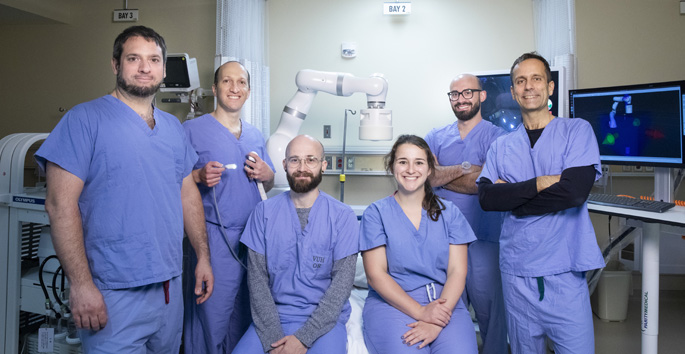
The Research Team: (From left to right) Dr. Bruno Scaglioni, Dr. Keith Obstein, Dr. James Martin, Claire Landewee, Dr. Simone Calò, and Dr. Pietro Valdastri. (Photograph courtesy of Susan Urmy)
STORMLab members, in collaboration with Vanderbilt Institute for Surgery and Engineering (VISE) and Atlas Endoscopy is excited to announce the initiation of the phase 1 clinical trial of their cutting-edge magnetic flexible endoscope. This revolutionary tool aims to offer a more secure alternative to the conventional colonoscopy, notably benefiting those with inflammatory bowel disease (IBD).
This ground-breaking endoscope, driven by magnets and state-of-the-art robotic technology, has begun human trials at Vanderbilt University Medical Center. The primary objective of phase 1 trials is to ensure the safety and viability of new treatments. For this initiative, the research has been bolstered by a generous $1.2 million grant from the National Institutes of Health, spanning four years.
More than 3 million Americans are affected by IBD, encompassing conditions like Crohn’s disease and ulcerative colitis. Both lead to chronic inflammation in the gastrointestinal (GI) tract, increasing the risk of colorectal cancer. Consequently, IBD patients undergo more regular GI tract evaluations, putting them at a higher risk for potential colonoscopy-related complications.
Dr. Keith Obstein, the lead investigator and a renowned professor at VUMC and Vanderbilt University, stated, “While colonoscopies remain essential for preventing colon cancer, many still shy away due to the associated fears and discomfort. This sentiment is even stronger among IBD patients. Through this innovation, we aim to make colon navigation safer for patients and streamline the process for medical professionals.”
What sets this endoscope apart is its design. It integrates a video camera, a permanent magnet at its tethered end, and an external permanent magnet linked to a robotic arm. The magnetic forces guide the endoscope through the colon. The produced magnetic field, in conjunction with a precise localization algorithm, informs the system of the endoscope’s position and orientation in the body. This allows the clinician to concentrate on lesion detection and treatment while the system handles the required movements.
Highlighting the key advantages, Dr. Obstein mentioned, “Instead of the traditional method of doctors pushing the colonoscope, the external magnet pulls the endoscope. This drastically minimizes the physical pressure on the patient’s colon, potentially diminishing sedation requirements and circumventing possible complications.”
This phase 1 trial is the culmination of 15 years of joint research between Dr. Obstein and Dr. Pietro Valdastri, the Chair in Robotics and Autonomous Systems at the University of Leeds. Both lead the STORM Lab initiatives in the USA and the UK.
Reflecting on the journey and the present scenario, Dr. Valdastri commented, “With the recent shift in recommended age for colorectal cancer screening, there’s an increased demand for colonoscopies. We’re optimistic that our technological advancement will not only meet this demand but also ensure a pain-free experience. It’s immensely gratifying to witness the onset of our phase 1 trial.”
The collaborative spirit fostered by Vanderbilt University, its Medical and Engineering Schools, and the Vanderbilt Institute for Surgery and Engineering, played a pivotal role in bringing this research to fruition. The National Institute of Biomedical Imaging and Bioengineering of the National Institutes of Health, under award number R01EB018992, supports this study.
